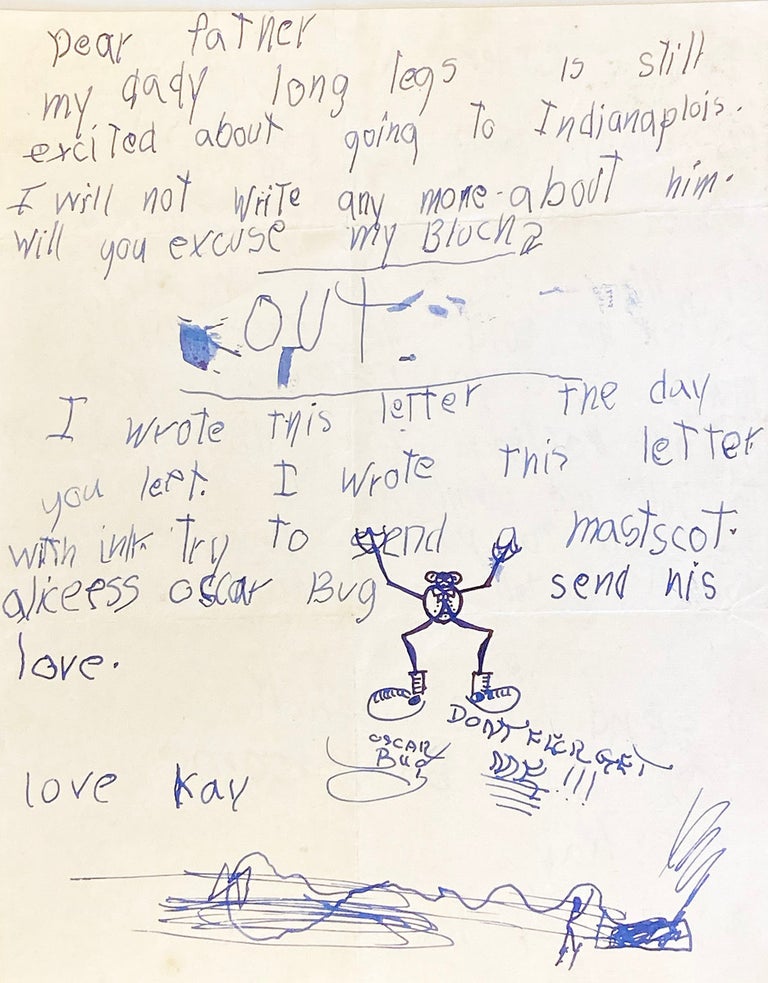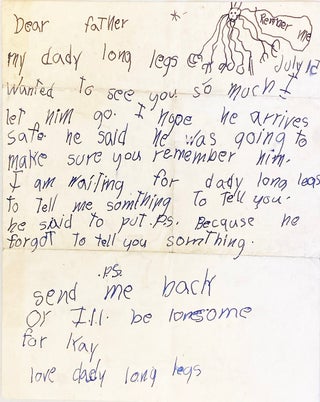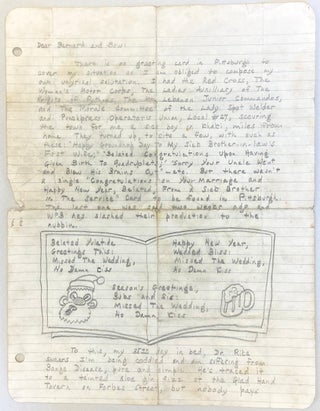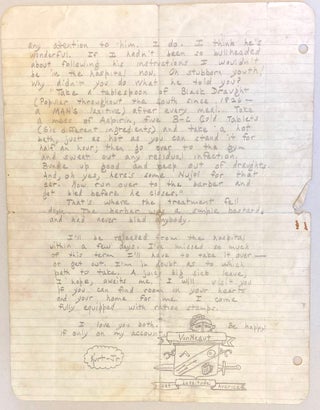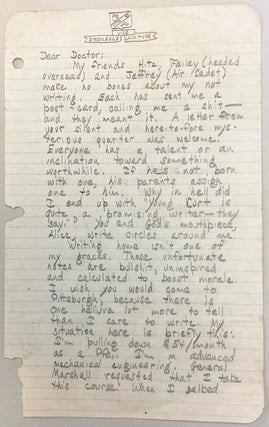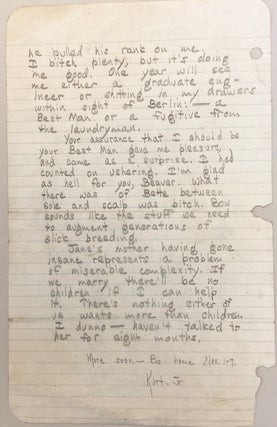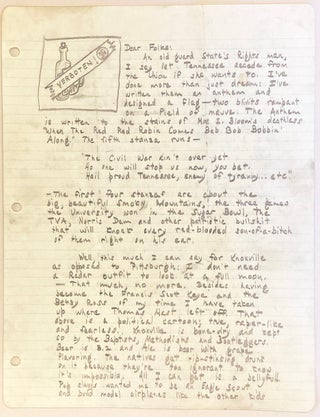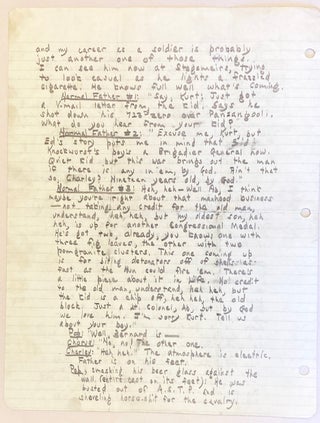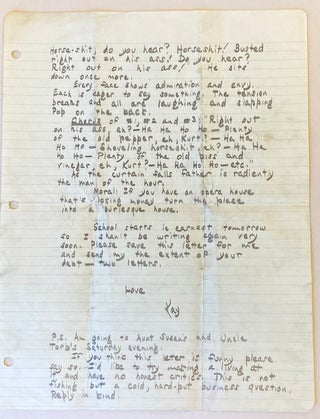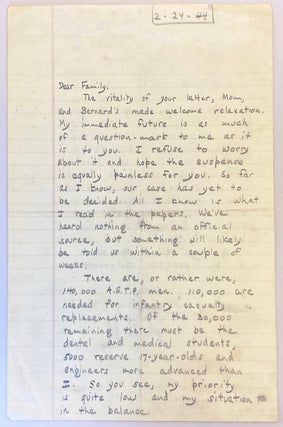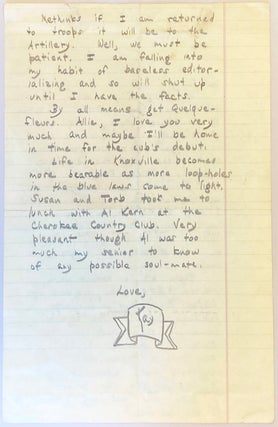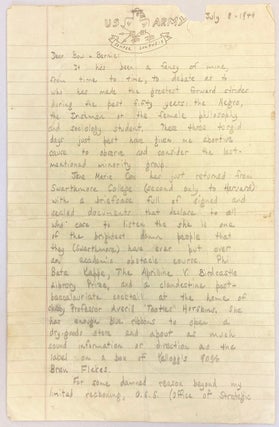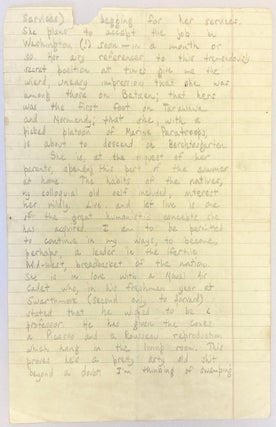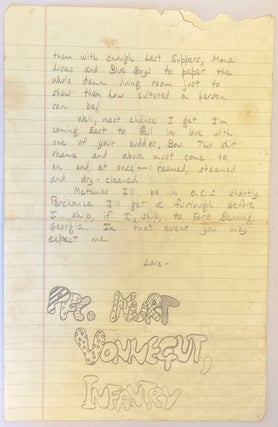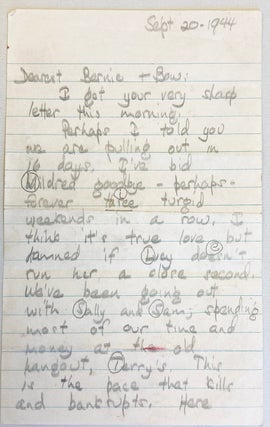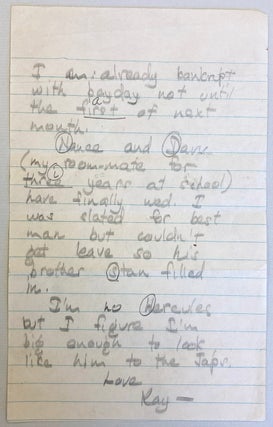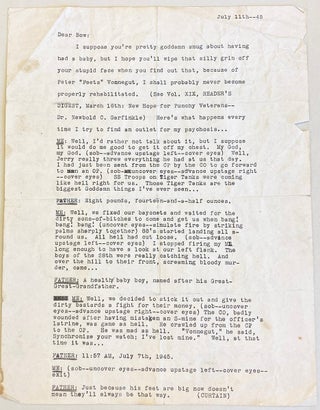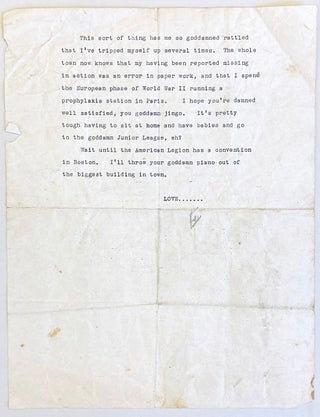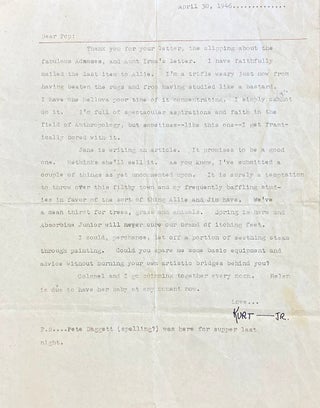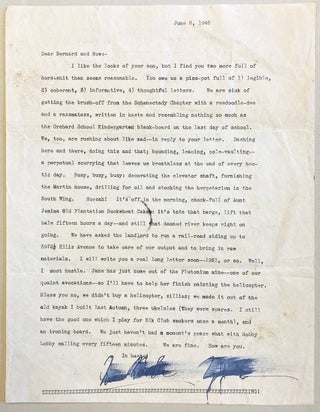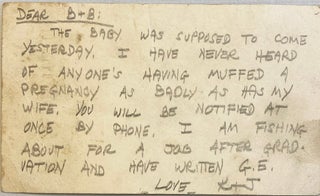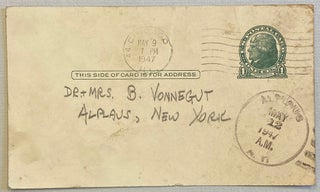Signed Family Letters
“The literary career of Kurt Vonnegut, Jr., is one exceedingly rich. He is at once common and exotic, quotidian and elite, and by his ability to comprehend and express such extremes, has become our great public writer. Spanning the length of America’s mid-century development and reaching the far limits of audiences, forms, and topics, Vonnegut has melded the disparate elements of what we have been into a coherent picture of what we are now.” –Jeremy Klinkowitz, The Literary Career of Kurt Vonnegut, Jr)
RARE AND REVEALING COLLECTION OF FAMILY LETTERS WRITTEN BY KURT VONNEGUT.
This collection of 12 letters, most of which are addressed to Vonnegut’s father, brother (Bernard), sister-in-law (Bow), and family as a whole, chronicle the life, rise, and development of one of America’s most beloved writers. Taken together, these letters – in which he begins to test the possibilities of a career in writing – are a unique glimpse into Vonnegut’s psychic and writerly interior, and bubble with the experimentality, imagination, and distinctive prose that would define Vonnegut’s most famous works in the decades to follow. Housed together in handsome archival case.
II. Letters 1-2: EARLY LIFE (Early 1930s)
“Kurt Vonnegut, whose dark comic talent and urgent moral vision in novels like “Slaughterhouse-Five,” “Cat’s Cradle” and “God Bless You, Mr. Rosewater” caught the temper of his times and the imagination of a generation” (Dinitia Smith, New York Times).
These first two letters are written by a young Kurt Vonnegut to his father. Born into a German American Midwest family in 1922, Vonnegut’s parents suffered enormously from the effects of the Great Depression; his father’s renowned architecture firm got hit hard, and his mother succumbed to drug and alcohol abuse, eventually taking her own life in 1944. The Great-Depression-era pessimism--as well as the general climate of social and political unrest in which young Vonnegut came of age--would greatly influence the tenor of his writing.
Although these letters were penned at a very young age, they still reflect the forms and attitudes that Vonnegut would make use of in his most famous books. His drawings, which appear in Letter 2 as well as in other places throughout this collection, testify to the “open secret” that was Vonnegut’s fine art career; not only did he create graphics for Slaughterhouse Five , (1969) and Breakfast of Champions, but also he was a prolific doodler, as he used art to think through, plot, and develop much of his fiction (“So It Goes”: Drawings by Kurt Vonnegut, Johnson Museum of Art ). Another aspect of note in these letters are his descriptions of insects, both his own “daddy long legs” and his sister Alice’s “oscar bug.” Whether the images of the bugs in amber in Slaughterhouse Five or Newt’s spider’s web in Cat’s Cradle (1963), Vonnegut’s insect fascination persisted throughout his life, the metaphorics of which played an important role in his fiction.
II. Letters 3-8: THE UNIVERSITY YEARS (1943-44)
Vonnegut “uses the rhetorical potential of the short sentence and the short paragraph better than anyone now writing, often getting a rich comic or dramatic effect by isolating a single sentence in a separate paragraph or excerpting a phrase from context for a bizarre chapter heading. The apparent simplicity and ordinariness of his writing masks its efficient power…” (Robert Scholes, The Fabulators).
Letters 3-8 were composed roughly around the time when Vonnegut had withdrawn from Cornell University to enlist in the Army. Reporting initially in March 1943 to Fort Bragg, North Carolina for basic training, Vonnegut then received instruction in mechanical engineering at the Carnegie Institute of Technology (based in Pittsburgh, the location from which Letter 3 was written) as well as the University of Tennessee (referenced in Letter 6) as part of the Army Specialized Training Program (ASTP). Due to the Army’s need for soldiers to support the D-Day invasion, Vonnegut was sent home to Indiana to train in an infantry battalion, ultimately getting deployed in the end of 1944 – as he explains in Letter 8.
What is most remarkable here is the emergence of a trademark Vonnegut style--short, pithy sentences, acerbic humor rendered in dialogue, the blending of vernacular and technical writing to offer commentary on war and the social order, the integration of song lyrics, headlines, and other pieces of pop culture--that would mark his post-war masterpieces and earn him the status of “literary idol” (Dinitia Smith). It is evident in these letters that he meant for them to be a space of potential and provocation: he mentions first in Letter 4 that one of his friends has already remarked on his writing talent, and then in Letter 5 after presenting the first sketches of a story, reveals that he’d like to “try making a living” at comedic writing.
III. Letters 9-12: LIFE AFTER WAR (1945-47)
"Aged veterans of the First World War had told Vonnegut that in 1918, when at this precise minute the gunfire and explosion had suddenly stopped, the silence sounded like the voice of God. Throughout his own career as a writer, he’d tried to give voice to the sentiments behind such memories of an ideal America.” (Jerome Klinkowtiz, Kurt Vonnegut’s America).
“Just as pure romance provides us with necessary psychic exercises, intellectual comedy like Vonnegut’s offers us moral stimulation—not fixed ethical position which we can complacently assume, but such thoughts as exercise our consciences and help us keep our humanity in shape, ready to respond to the humanity of others” (Robert Scholes, The Fabulators).
Letters 9-12 were written shortly after Vonnegut’s return to the United States. Letter 9 is a portal into Vonnegut’s violent and vivid experience of war: in 1945, as a prisoner of war, Vonnegut experienced the firebombing of Dresden, Germany by Allied Forces. This personally transformative event would become the basis for one of Vonnegut’s most celebrated works, the “story and structure of which became best-selling metaphors for the new age” (Dinitia Smith): Slaughterhouse Five. Letter 9, written shortly after his return to the U.S., describes a graphic war sequence in dialogue format, remarkably echoing many passages in the novel about the protagonist’s Billy Pilgrim’s experience of war.
The following three letters, equally zippy and biting in tone, mark an important period of transition in Vonnegut’s life. After marrying Jane Marie Cox (whose life is vividly described in Letter 7) in 1945, the pair relocated to Chicago, where the two enrolled in studies at the University of Chicago: Cox in Russian literature, and Vonnegut in anthropology. After their first child Mark was born in 1947, the two left Chicago (Vonnegut, famously, sans degree) for Schenectady, so he could take a new job at G.E. His new stint provided much writerly fodder: according to him, “the job required my visiting the scientists and talking to them and asking them what they were up to. Every so often a good story would come out of it.” And good stories came: his first novel Player Piano, about a dystopian world run by machines, was published in 1952. Moreover, the characters and themes of artificial weather control in his later novel Cat’s Cradle were inspired by the work and research of GE’s Dr. Irving Langmuir, the boss of his brother Bernard (who had recommended Kurt for the PR job at G.E.).
A fascinating and historically important collection of letters that capture Vonnegut as his best, that show the many worlds in which he moved, as well as his own journey of “effectively creat[ing] whole new worlds” (Klinkowitz).
12 letters on 12 sheets of different sizes, 1 postcard; a total of 22 sides. Includes 9 handwritten letters (in both ink and pencil), often with drawings by Vonnegut, and 3 typed letters. General, expected wear (folds, some chipping to edges), but overall extremely well-preserved. Letter 11 with smeared ink signatures. Housed in handsome presentation case.
–––––––––––––––––––––
Transcribed text of the letters:
[Note: Letters 1 and 2 are on the same sheet of paper, front and back.]
LETTER 1:
Dear father
My daddy long legs is still excited about going to Indianaplois [sic]. I will not write any more about him. Will you excuse my Blotch
OUT
I wrote this letter the day you left. I wrote this letter with ink. Try to send a mastscot [sic]. aliceess oscar bug send his love.
[drawing of bug, with text underneath that reads “DONT FORGET NDE/Oscar Bug”]
love kay
[Note: Drawings play an important role in Vonnegut’s later work, namely Breakfast of Champions and Slaughterhouse-Five. Large felt-tip illustrations crop up in each of these books, visualizing the worlds that the author created.]
LETTER 2:
Dear Father
[drawing of spider below star/asterisk w/ text “rember [sic] me”]
July 15 [5 written backwards]
My daddy long legs wanted to see you so much I let him go. I hope he arrives safe. he said he was going to make sure you remember him. I am waiting for daddy long legs to tell me something to tell you. he said to put p.s. Because he forgot to tell you somthing [sic].
P.S.
send me back
Or I’ll be lonesome
for Kay
love daddy long legs
[Note: The year this letter was written is unclear, but given the style of drawing and writing style, it’s likely to have been written when Vonnegut was a child (late 20s, early 30s).]
LETTER 3 (late 1943/early 44):
Dear Bernard and Bow:
There is no greeting card in Pittsburgh to cover my situation so I am obliged to compose my own unlyrical salutation. I had the Red Cross, the Women’s Motor Corps, The Ladies Auxiliary of the Knights of Pythias, The Mt. Lebanon Junior Commandos, and the Morale Committee of the Lady Spot Welder and Punchpress Operator’s Union, Local #27, scouring the town for me, a sick boy in khaki, miles from home. They turned up, to cite a few, with such as there: Happy Groundhog Day To My Brother-in-law’s First Wife;” “Belated Congratulations Upon Having Giving Birth To Quadruplets;” “Sorry Your Uncle Went and Blew His Brains Out” — etc. But there wasn’t as single “Congratulations on Your Marriage and Happy New Year, Belated, From a Sick Brother in The Service” Card to be found in Pittsburgh. The last one was said two weeks ago and WPB has slashed their production to the nubbin.
[drew his own Christmas card; text is as follows….]
left side: Belated Yuletide/Greetings This:/Missed The Wedding,/No Damn Kiss
center panel: Season’s Greetings,/Bubs and Sis:/Missed The Wedding,/No Damn Kiss
right side: Happy New Year,/Wedded Bliss:/Missed the Wedding,/No Damn Kiss
[drawing of Santa w/ a cigar in his mouth on the right and left-side drawing of beer]
To this, my 35th day in bed, Dr. Rike swears I’m being coddled and am suffering from Bang’s disease, pure and simple. He’s traced it to a tainted sloe gin fizz at the Glad Hand Tavern on Forbes Street, but nobody pays any attention to him. I do. I think he’s wonderful. If I hadn’t been so bullheaded about following his instructions I wouldn’t be in the hospital now, Oh stubborn youth! Why didn’t you do what he told you?
“Take a tablespoon of Black Draught (Popular throughout the South since 1826 — a MAN’s laxative) after every meal. Take a mess of Aspirin, fives B-C Cold Tablets (six different ingredients) and take a hot bath, just as hot as you can stand it for half an hour; then go over to the gym and sweat out any residual infection. Bundle up good and keep out of draughts. And, oh yes, here’s some Nujol for that ear. Now run over the barber and get bled before he closes.”
That’s where the treatment fell down. The barber was a simple bastard, and had never bled anybody.
I’ll be released from the hospital within a few days. I’ve missed so much of this term. I’ll have to take it over — or get out. I’m in doubt as to which path to take. A juicy big sick leave, I hope, awaits me. I will visit you if you can find room in your hearts and your home for me. I come fully equipped with ration stamps.
[left: I love you both, if only on my account.] [right: Be happy]
signed by Kurt-Jr
coat of arms drawing: writing inside is “Vonnegut” on type: code words are Lust/Lassitude/Avarice
[Note: Bow (full name Lois Bowler Vonnegut) is the name of Kurt Vonnegut’s older brother, Bernard Vonnegut’s, wife.]
LETTER 4 (early 1944: studying engineering at U of TN)
[seal: Vice/Indolence/Lassitude]
Dear Doctor:
My friends Hitz, Failey (headed overseas) and Jeffrey (Air Cadet) make no bones about my not writing. Each has sent me a post-card, calling me a shit—and they meant it. A letter from your silent and here-to-fore mysterious quarter was welcome. Everyone has a talent or an inclination toward something worthwhile. If he’s not born with one, his parents assign one to him. Why in hell did I end up with “Young Kurt is quite a promising writer—they say.”? You and God’s mouthpiece, Alice, write circles around me.
Writing home isn’t one of my graces. Those unfortunate notes are bullshit, uninspired and calculated to boost morale. I wish you would come to Pittsburgh, because there is one helluva lot more to tell than I care to write. My situation here is briefly this: I’m pulling down $54/month as a Pfc.. I’m in advanced mechanical engineering. General Marshall requested that I take this course. When I balked he pulled his rank on me. I bitch plenty, but it’s doing me good. One year will see me either a graduate eng-ineer or shitting in my drawers within sight of Berlin: — a Best Man or a fugitive from the laundryman.
Your assurance that I should be your Best Man gave me pleasure, and came as a surprise. I had counted on ushering. I’m glad as hell for you, Beaver. What there was of Bette between sole and scalp was bitch. Bow sounds like the stuff we need to augment generations of slick breeding.
Jane’s mother having gone insane represents a problem of miserable complexity. If we marry there’ll be no children if I can help it. There’s nothing either of us wants more than children. I dunno — haven’t talked to her for eight months.
More soon — Be home Nov 1-7.
Kurt. Jr.
[Note: One person mentioned in this letter is probably Benjamin Fitz, an American businessman and collector famous for collecting materials on Indiana, the Midwest, and writers Mary Webb and Willa Cather. He has the same name as Dr. Benjamin, the chief obstetrician in Vonnegut’s short story “2 B R O 2 B” set in a world that relies on assisted suicide to control population growth. Another is most likely Maije Failey, one of Vonnegut’s oldest friends and married to another of his closest childhood friends.]
LETTER 5 (EARLY 1944):
["Verboten" w/ swastika drawing in top corner].
Dear Folks:
An old Guard State’s Rights man, I say let Tennessee secede from the Union if she wants to. I’ve done more than just dream. I’ve written them an anthem and designed a flag — two blivets rampant on a field of mauve. The Anthem is written to the stains of Moe I, Blooms deathless “When the Red Red Robin Comes Bob Bob Bobbin’ Along.” The fifth stanza runs —
“The Civil War ain’t over yet
Ho one will stop us now, you bet
Hail proud Tennessee, enemy of tyranny...etc.”
— The first four stanzas are about the big, beautiful Smoky Mountains, the three games the University won in the Sugar Bowl, The TVA, Norris Dam and other patriotic bullshit that will knock every red-blooded son-of-a-bitch of them right on his ear.
Well, this much I can say for Knoxville as opposed to Pittsburgh: I don’t need a Radar outfit to look at a full moon. — That much, no more. Besides having become the Francis Scott Keye [sic] and the Betsy Ross of my time I have taken up where Thomas Mast left off. That above is a political cartoon; true, rapier-like, and fearless, Knoxville is bone-dry and kept so by the Baptists, Methodists, and Bootleggers. Beer is (B.2. B.S.?) and Ale is beer with grape flavoring. The natives get rib-stinking drunk on it because they’re too ignorant to know it’s impossible. All I can get is a bellyfull [sic]. Pop always wanted me to be an Eagle Scout and build model airplanes like the other kids and my career as a soldier is probably just another one of those things. I can see him now at Stegemeirs, trying to look casual as he lights a frazzled cigarette. He knows full well what’s coming.
Normal Father #1: “Say, Kurt: Just got a V-mail letter from the kid. Says he shot down his 723rd zero over Panzangooli. What do you hear from your kid?”
Normal Father #2: “Excuse me Kurt, but Ed’s story puts me in mind that Sid Knockwurst’s boy’s a Brigadier General now. Quiet Kid, but this war brings out the man if there is any in ‘em, by God. Ain’t that so, Charley? Nineteen years old, by God.”
Normal Father #3: “Heh, heh — well Ab, I think maybe you’re right about that manhood business — not taking any credit for the old man, understand, heh heh, but my oldest son, heh heh, is up for another Congressional Medal. He’s got two, already, you know: one with three fig leaves, the other with two pomegranate clusters. This one coming up is for biting detonators off of shells as fast as the Hun could fire em. There’s a little piece about it in Life. No credit to the old man, understand, heh heh, but this kid is a chip off, heh heh, the old block. Just a Lt. Colonel, Ab, but by God we love him. I’m sorry Kurt. Tell us about your boy.”
Pop: “Well Bernard is —
Chorus: “No, no! The other one.
Charley:“Heh heh.” The atmosphere is
electric. Father is on his feet.
Pop:, smashing his beer glass against the wall, retire case on its feet ): He was busted out of A.S.T.P. and is shoveling horseshit for the cavalry.
Horse-shit, do you hear? Horseshit! Busted right out on his ass! Do you hear? Right out on his ass!” He sits down once more.
Every face shows admiration and envy. Each is eager to say something. The tension breaks and all are laughing and slapping Pop on the back. Each is eager to say something. The tension breaks and all are laughing and slapping Pop on the back.
Chorus of #1, #2 and #3: “Right out on his ass, eh? — Ha Ha Ho Ho — Plenty of the Old Pepper, eh, Kurt? — Ha Ha Ho Ho — Shoveling Horseshit, eh? — Ha Ha Ho Ho — Plenty of the old piss and vinegar, eh, Kurt? — Ha Ha Ho Ho — etc.”
As the curtains falls father is radiently [sic] the man of the hour.
Moral: If you have an opera house that’s losing money turn the place into a burlesque house.
School starts in earnest tomorrow so I shan’t be writing again very soon. Please save this letter for me and send my [sic] the extent of your debt — two letters.
Love
Kay
P.S. Am going to Aunt Susan’s and Uncle Torb’s/Tarb’s Saturday evening.
If you think this letter is funny please say so. I’d like to try making a living at it and have no honest critics. This is not fishing but a cold, hard-put business question. Reply in kind.
[Note: Kurt Vonnegut’s intentions are revealed here. In this letter, he had already begun to set the groundwork for much of the humor--and literary tropes--that would populate his early short stories.]
LETTER 6:
2-24-44
Dear Family,
The vitality of your letter, Mom, and Bernard’s made welcome relaxation. My immediate future is as much of a question-mark to me as it is to you. I refuse to worry about it and hope the suspense is equally painless for you. So far as I know, our case has yet to be decided. All I know is what I read in the papers. We’ve heard nothing from an official source, but something will be told [sic] us within a couple of weeks.
There are, or rather were, 140,000 A.S.T.P. men. 110,000 are needed for infantry casualty replacements. Of the 30,000 remaining there must be the dental and medical students, 5000 reserve 17-year-olds and engineers more advanced than I. So you see, my priority is quite low and my situation in the balance.
Methinks if I am returned to troops it will be to the Artillery. Well, we must be patient. I am falling into my habit of baseless editorializing and so will shut up until I have the facts.
By all means gets Quelque-fleurs. Allie, I love you very much and maybe I’ll be home in time for the cub’s debut.
Life in Knoxville becomes more bearable as more loop-holes in the blue laws come to light. Susan and Torb took me to lunch with Al Kern at the Cherokee Country Club. Very pleasant though Al was too much my senior to know of any possible soul-mate.
Love,
Kay [in ribbon]
[Note: Vonnegut qualified for the Army Specialized Training Program based on his aptitude test scores and IQ. Upon completion of the program, he would graduate from the University of Tennessee and receive an officer’s commission. In 1944, there was a great reduction in the strength of the ASTP due to the rising need for infantry troops. Vonnegut gets sent to Camp Atterbury, Indiana (close to home) to train with the 106th infantry division... Allie in the letter is most likely a nickname for Alice, Vonnegut’s younger sister and widely considered his artistic muse.]
Letter 7:
[Note: Vonnegut’s mother Edith had killed herself by overdosing on sleeping pills on May 14, 1944.]
July 8 - 1944
Dear Bow + Bernie:
It has been a fancy of mine, from time to time, to debate as to who has made the greatest forward strides during the past fifty years: the Negro, the Irishman or the female philosophy and sociology student. These three turgid days just pays have given me abortive cause to observe and consider the last-mentioned minority group.
Jane Marie Cox has just returned from Swarthmore College (second only to Harvard) with a briefcase full of signed and sealed documents that declare to all who care to listen the [sic] she is one of the brightest damn people that they (Swarthmore) have ever put over an academic obstacle course. Phi Beta Kappa, The Aprilline V. Birdcastle Library Prize, and a clandestine post-baccalaureate cocktail at the home of chubby Professor Averil “Tooties” Horskins. She has enough blue ribbons and above as much sound information or direction as the label on a box of Kellogg’s 90% Bran Flakes.
For some damned reason beyond my limited reckoning, O.S.S. (Office of Strategic Services) begging for her services. She plans to accept the job in Washington soon — in a month or so. Her airy references to this tremendously secret position at times give me the wierd [sic], uneasy impression that she was among those on Bataan; that hers was the first foot on Tarawana and Normandy; that she, with a picked platoon of Marine Paratroops, is about to descend on Berchtesgarten.
She is, at the request of her parents, spending this part of the summer at home. The habits of the natives, my colloquial old self included, interest her mildly. Live and let live is one of the great humanistic concepts she has acquired. I am to be permitted to continue in my ways, to become, perhaps, a leader in the fertile Mid-West, breadbasket of the nation. She is in love with a Navel Air Cadet who, in his freshman year at Swarthmore (second only to Harvard) stated that he wished to be a professor. He has given the Coxes a Picasso and a Rousseau reproduction which hang in the living room. This proves he’s a pretty arty old shit beyond a doubt. I’m thinking of swamping them with enough Last Suppers, Mona Lisas and Blue Boys to paper the whole damn living room just to show them how culture a person can be.
Well, next chance I get I’m coming East to fall in love with one of your buddies, Bow. This shit shame and abuse must come to an end at once — : reamed, steamed, and dry-cleaned.
Methinks I’ll be in O.C.S. shortly. Perchance I’ll get a furlough before I ship, if I ship, to Fort Benning, Georgia. In that event you may expect me.
Love -
[in bubble letters]: P.F.C Kurt Vonnegut, Infantry
[Note: Jane Marie Cox was Vonnegut’s high school sweetheart. The two had a twenty-year marriage, raising six children. The couple gave birth to three children, and adopted Vonnegut’s sister’s three children after her and her husband tragically died... Around this time, Cox began her job as a clerk analyst in the counterintelligence branch of the O.S.S. (an organization considered to be the forerunner of the CIA)... The Naval Air Cadet he mentions is Kendall Landis, a Swarthmore first-year who dropped out to become a Navy Air Cadet. While abroad, he continuously corresponded with Cox.]
Letter 8:
Sept 20 - 1944
Dearest Bernie + Bow:
I got your very sharp letter this morning.
Perhaps I told you we are pulling out in 16 days. I’ve bid Mildred goodbye - perhaps - forever Haree [sic, Harie] turgid weekend in a row. I think it’s true love but damned if Lucy doesn’t run her a close second. We’ve been going out with Sally and Sam; spending most of our time and money at the old hangout, Terry’s. This is the pace that kills and bankrupts. Here I am: already bankrupt with payday not until the first of next month.
Nanee and Dane (my roommate for three years at school) have finally wed. I was slated for best man but couldn’t get leave so his brother Stan filled in.
I’m no Hercules but I figure I’m big enough to look like him to the Japs.
Love
Kay–
Letter 9: [Note: To frame this later around important dates in Vonnegut’s life: he was released as a prisoner of war on May 29, 1945, and married Jane Marie Cox on September 1, 1945. (Vonnegut was captured as a prisoner of war during the Battle of the Bulge. He survived the firebombing of Dresden in an underground meat locker with other prisoners; he sketches out a similarly gruesome scene in Slaughterhouse-Five.)]
July 11th--45
Dear Bow:
I suppose you’re pretty goddamn smug, but I hope you’ll wipe that silly grin off your stupid face when you find out that, because of Peter “Feets” Vonnegut, I shall probably never become properly rehabilitated. (See Vol. XIX, READER’S DIGEST, March 16th: New Hope for Punchy Veterans--Dr. Newbold C. Garfinkle) Here’s what happens every time I try to find an outlet for my psychosis…
ME: Well, I’d rather not talk about it, but I suppose it would do me good to get it off my chest. My God, my god. (sob--advance upstage left--cover eyes) Well, Jerry really threw everything he had at us that day. I had just been sent from the CP by the CO to go forward to man an OP. (sob-uncover eyes--advance upstage right--cover eyes) SS troops on Tiger Tanks were coming like hell right for us. Those Tiger Tanks are the biggest goddamn things I’ve ever seen…
FATHER: Eight pounds, fourteen-and-a-half ounces.
ME: Well, we fixed our bayonets and waited for the dirty sons-of-bitches to come and get us when bang! bang! bang! (uncover eyes--stimulate fire by striking palms sharply together) 88’s started landing all around us. All hell had cut loose. (sob--advance upstage left--cover eyes) I stopped firing my MI long enough to have a look at our left flank. The boys of the 28th were really catching hell. And over the hill to their front, screaming bloody murder, came…
FATHER: A healthy baby boy, named after his Great-Great-Grandfather.
ME: Well, we decided to stick it out and give the dirty bastards a fight for their money. (sob--uncover eyes--advance upstage right--cover eyes) The CO, badly wounded after having mistaken an S-mine for the officer’s latrine, was game as hell. He crawled up from the CP to the OP. He was mad as hell. “Vonnegut,” he said, Synchronize your watch; I’ve lost mine.” Well, at that time it was…
FATHER: 11:57 AM, July 7th, 1945.
ME: (sob--uncover eyes--advance upstage left--cover eyes--exit)
FATHER: Just because his feet aren’t big now doesn’t mean they’ll always be that way. (CURTAIN)
This sort of thing has me so goddamn rattled that I’ve tripped myself up several times. The whole town now knows that my having been reported missing in action was an error in paper work, and that I spent the European phase of World War II running a prophylaxis station in Paris. I hope you’re damned well satisfied, you goddamn jingo. It’s pretty tough having to sit at home and have babies and go to the goddamn Junior League, eh?
Wait until the American Legion has a convention in Boston. I’ll throw your goddamn piano out of the biggest building in town.
LOVE…….
[printed] Kay
[Note: Peter Vonnegut was the son of Alice Vonnegut, Kurt’s younger sister, and James Carmalt Adams. Vonnegut and Cox took in their four soon after both parents died; however, Peter only spent a year with them before being given to the care of a paternal relative in Georgia... In this letter, Vonnegut sets up the fact that he’s been trying to deal with the trauma of his imprisonment... The dialogue format--use to capture brief experiences in time--would come to play an important role in Slaughterhouse Five.]
Letter 10: [Note: To ground this letter in the larger timeline of Vonnegut’s life: both Vonnegut and Cox were enrolled in the University of Chicago from 1945 to 1947: Vonnegut to study anthropology and Cox Russian literature. Vonnegut’s thesis was rejected (although his novel Cat’s Cradle was ultimately accepted as his thesis in 1971) and Cox dropped out because she was pregnant with their first child, Mark.]
April 30, 1946 …..
Thank you for your letter, the clipping about the fabulous Adamses, and
Aunt Irma’s letter. I have faithfully mailed the last item to Allie. I’m a trifle weary just now from having beaten the rugs and from having studied like a bastard. I have one helluva poor time of it concentrating. I simply cannot do it. I’m full of spectacular aspirations and faith in the field of Anthropology, but sometimes--like this one--I get frantically bored with it. Jane is writing an article. It promises to be a good one. Methinks she’ll sell it. As you know, I’ve submitted a couple of things as yet uncommented upon. It is surely a temptation to throw over this filthy town and my frequently baffling studies in favor of the sort of thing Allie and Jim have. We’ve a mean thirst for trees, grass and animals. Spring is here and Absorbine Junior will never cure our brand of itching feet.
I could, perchance, let off a portion of seething steam through painting. Could you spare me some basic equipment and advice without burning your own artistic bridges behind you?
Colonel and I go swimming together every noon. Helen is due to have her baby at any moment now.
Love…
Kurt — JR. (signed)
P.S….Pete Daggett was here for supper last night.
[Note: These Adamses he mentions are probably the family of Vonnegut’s deceased brother-in-law, James Carmalt Adams.]
LETTER 11:
June 6, 1946
Dear Bernard and Bow:—
I like the looks of your son, but I find you two more full of horseshit than seems reasonable. You owe us a piss-pot full of 1) legible, 2) coherent, 3) informative, 4) thoughtful letters. We are sick of getting the brush-off from the Schenectady Chapter with a reedoodle-dee and razzmatazz, written in haste and resembling nothing so much as the Orchard School Kindergarten black-board on the last day of school. We, too, are rushing about like mad--in reply to your letter. Dashing here and there, doing this and that; bounding, leaping, pole-vaulting--a perpetual scurrying that leaves us breathless at the end of every hectic day. Busy, busy, busy: decorating the elevator shaft, furnishing the Martin house, drilling for oil and stocking the herpetarium in the South Wing. Huzzah! It’s off in the morning, chock-full of Aunt Jemima Old Plantation Buckwheat Cakes: it’s tote that barge, lift that bale fifteen hours a day--and still that damned river keeps right on going. We have asked the rail-road siding up to 3972 ¼ Ellis Avenue to take care of our output and to bring in raw materials. I will write you a real long letter soon--1951, or so. Well, I must hustle. Jane has just come out of the Plutonium nine--one of our quaint avocations--so I’ll have to help her finish painting the helicopter. Bless you no, we didn’t buy a helicopter, sillies; we made it out of the old kayak I built last autumn, three ukeles (They were spares. I still have the good one which I play for Elk Club smokers once a month), and an ironing board. We just haven’t had a moment’s peace what with Hobby Lobby calling every fifteen minutes. We are fine. How are you.
In haste:
(smeared signature)
ZZZZZZZZZZZZZZZZZZZZZZZZZZZZZZZZZZZZZZZZZZZZZZZZZZZZZZZZZZZZING!
[Note: Bernard was the older brother of Kurt Vonnegut. The author was often jealous of his older brother because of his scientific prowess (he worked as an atmospheric scientist)... Vonnegut was hired as a publicist by General Electric (G.E.) at the Schenectady Research Laboratory. The location provided much writerly fodder for Vonnegut, appearing in his novels Cat’s Cradle, Slaughterhouse-Five, and Player Piano.]
Letter 12: [postcard, 1947]
Dear B + B:
The baby was supposed to come yesterday. I have never heard of anyone’s having muffed a pregnancy as badly as has my wife. You will be notified at once by phone. I am fishing about for a job after graduation and have written by G.E.
Love_K+J
[Note: It was this job at General Electric that finally gave Vonnegut more time to write, as he published his first story, “Report on the Barnhouse Effect” (1950) while there.].
Price: $35,000 .


